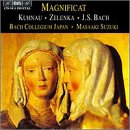| All Artists: Johann Sebastian Bach, Johann Kuhnau, Jan Dismas Zelenka, Bach Collegium Japan Orchestra, Yukari Nonoshita, Gerd Turk Title: Magnificat Members Wishing: 1 Total Copies: 0 Label: Bis Release Date: 5/1/1999 Album Type: Import Genre: Classical Styles: Opera & Classical Vocal, Historical Periods, Baroque (c.1600-1750) Number of Discs: 1 SwapaCD Credits: 1 UPCs: 7318590010112, 789368961023 |
Search - Johann Sebastian Bach, Johann Kuhnau, Jan Dismas Zelenka :: Magnificat
 | Johann Sebastian Bach, Johann Kuhnau, Jan Dismas Zelenka Magnificat Genre: Classical
Bach's setting of the Magnificat is one of his most often-recorded vocal works; as a rule, it's paired with one of Bach's lavishly scored festal cantatas. (The Easter Oratorio seems to be a current favorite.) Masaaki Su... more » |
Larger Image |
CD Details
Synopsis
Amazon.com
Bach's setting of the Magnificat is one of his most often-recorded vocal works; as a rule, it's paired with one of Bach's lavishly scored festal cantatas. (The Easter Oratorio seems to be a current favorite.) Masaaki Suzuki and the Bach Collegium Japan had a different idea: they've paired Bach's Magnificat with roughly contemporary settings by Johann Kuhnau, who was Bach's immediate predecessor in Leipzig, and Jan Dismas Zelenka, who was a composer at the court of Saxony in Dresden. Zelenka is an interesting composer, among the most underrated of the Baroque era. His writing is less dense and intricate than Bach's--at times it looks forward to the simpler, more elegant style of Haydn and C.P.E. Bach. Zelenka knew his counterpoint, however, and was fond of slipping the occasional surprising chord change into his music. The two Magnificat settings by Zelenka presented here are relatively short (about 10 minutes each) and cover most of the text in their opening movements, which are extended choruses with full orchestra and florid soprano solos; each concludes with a splendid fugal "Amen" along the lines of the one Handel used to conclude Messiah. Kuhnau's Magnificat, on the other hand, has a format much like Bach's: each verse of the canticle is set as a separate short movement, with choruses and solo movements alternating. Set beside Bach's dazzling setting, Kuhnau's can't help but seem bland, but it's festive and pleasant to hear. As for the Bach--well, the BCJ has an awful lot of competition; they don't quite achieve the gusto of Gardiner, the radiance of Koopman, or the sheer manic energy of Parrott, but Suzuki and his choir truly get the measure of such fugal choruses as "Sicut locutus" (and Zelenka's "Amen" choruses), and they acquit themselves well overall. Countertenor Akira Tachikawa has done plenty of ensemble singing in Europe with such groups as Concerto Vocale and Ensemble Gilles Binchois; he copes well enough here, but doesn't seem to have yet the soloistic flair of his fellows Yoshikazu Mera and Robin Blaze. Bass soloist Chiyuki Urano is somewhat stolid; tenor Gerd Türk sings eloquently (if with a bit of strain). The two sopranos, however, get the most to sing, and the bright, clear voices of Miah Persson and Yukari Nonoshita steal this show entirely. --Matthew Westphal

 Track Listings (31) - Disc #1
Track Listings (31) - Disc #1